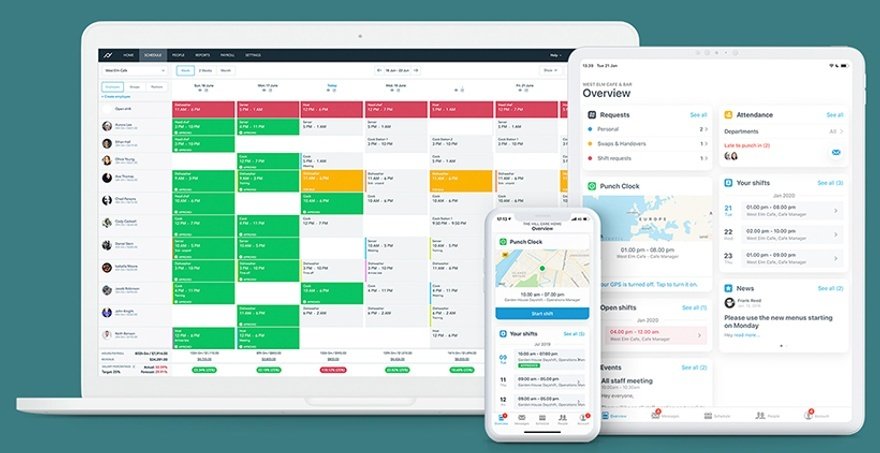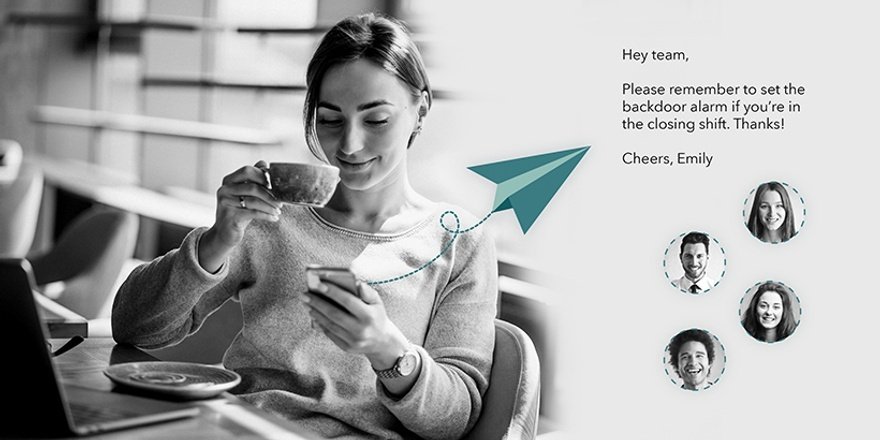Workforce management technology used to be a ‘nice to have' option for many hospitality businesses. But with customer demand unpredictable, rules and regulations changing almost daily and staff anxious about returning to work, more operators are starting to recognise its value. Elly Earls reports.
As a high turnover, shift-based industry, workforce management has never been easy for hospitality. But the uncertainty created by the coronavirus crisis is making it harder than ever. With the timing, frequency and duration of customer visits lacking consistency, there aren't any established trading patterns on which to base staffing, leaving operators to manage their workforce commitments in the dark.
There are also challenges around deciphering the complexity of new rules and regulations, such as furlough schemes and lockdowns, which change on a regular basis, often with regional differences. In addition, many staff have anxieties over returning to work or burning out when they do.
And that's not all. "Where previously organisations staffed to customer demand, they now need to consider safe venue capacity, too," explains Neil Pickering, industry and customer insights expert at UKG (Ultimate Kronos Group), which provides cloud-based workforce management solutions.
"Managers need to know in real time exactly how many people they have sick, how many are available for work and who has particular skills and certifications. Scheduling people based on teams or bubbles is now also necessary for many. Plus, being able to react quickly when someone does fall sick and perform the necessary actions, such as contact tracing of other employees, is essential."
Being able to react quickly when someone does fall sick and perform the necessary actions, such as contact tracing of other employees, is essential
With so many factors to consider, flexibility and communication are crucial to both align labour resources accurately to meet customer demand and keep employees safe, healthy and engaged. And while it's certainly still possible to manage these workforce demands manually, it's far from the most efficient – or safest – way of doing things.
"Hospitality needs to rebuild and grow while responding to the restrictions placed upon it, but must retain an efficient operating model that eliminates staff downtime," says Henry Seddon, managing director of Access Hospitality.
"Workforce management software can get as close as possible to a realistic forecast and provide the tools that allow you to flex your plan.
"It can easily adapt a forecast based on the best estimate of what might happen, rather than starting from scratch, allowing an immediate response to different situations, such as the recent imposition of a 10pm curfew. It allows you to develop a best- and worst-case scenario to plan for labour demand and keep employees in the picture, while still allowing for reactive changes to be made."
More focus on employee wellbeing
According to Brett Smith, director of customer success at Planday, which provides employee scheduling software, Covid-19 has really changed the conversation around digital tools. "A few months ago, having a tool that manages everything you need in hospitality – from scheduling to communications, payroll, reports and shift swaps – was a ‘nice to have' for many businesses," he says. "What we've seen in the last few months is that the businesses that have used [digital tools] can react faster and be more informed about staff changes, costs and other information they need to make better decisions."
In many cases, operators that already have workforce management technology up and running are using it differently than they did before. "The focus has expanded from letting the system do what it is designed to do, in using the integrated algorithms to develop a workforce plan based on previous trading patterns, to being applied in response to unforeseen situations and an operator's gut feeling about what might happen next," says Seddon.
He's also seen more operators recognise the benefit of workforce management software in strengthening employee relationships and managing their wellbeing. "Historically, staff haven't talked enough about how they feel, their insecurities and worry over whether they will have enough shifts, or even a job, and their motivation affects their long-term health and the way they interact with customers," he says.
Clearly this is more important than ever before. The Workforce Institute at UKG recently commissioned research into leadership and employee attitudes and opinions on the impact Covid-19 has had on workplace expectations and concerns, as well as contact tracing and trust. It found that 46% are concerned about being quickly informed about presumed or confirmed positive Covid-19 cases in the workplace and 43% are concerned about their company's ability to react quickly to presumed or confirmed positive Covid-19 cases in the workplace.
On the operational front, workers are most worried about future redundancies due to economic instability (40%), the ability to balance workloads to prevent fatigue/burnout (39%) and the ability to offer necessary learning and development opportunities (30%). "Alleviating these staffing concerns will be critical for the foreseeable future in keeping the workforce engaged and inspired," says Pickering.
One relevant feature in the Kronos solution is Attestation, a survey tool that allows employees to confirm how they are feeling and whether they have any symptoms before the start of their shift. Based on responses to the survey, which can be presented on their mobile device, relevant actions can be taken automatically.
Access has also upgraded its system to include a feedback campaign, which engages with staff every time they log in or out or connect via their mobile device. "This might include running a Covid survey detailing health aspects, their current sentiment, and whether they feel safe and supported in the workforce. It could also include sending alerts to the team if they have been in contact with someone who has subsequently tested positive for the virus," Seddon explains.
Self-service scheduling
On the scheduling front, the key is for operators to be as agile as possible, understanding that staff availability can change in an instant and being ready to adapt and communicate any schedule changes across the organisation in real time.
"For food and hospitality services, the ability to create groups across functional lines can help ensure coverage across roles while maintaining social distancing," explains Wendy Muirhead, vice-president of Ceridian Europe, another provider of cloud HR software. "Giving staff access to their schedules from any device provides flexibility, for instance, in the event of changes to the rotation or if a team member becomes ill. Employees are notified as quickly as possible and can access the information when and where it's convenient to them."
Increasingly, staff also have the power to manage their own schedules thanks to self-service software. "The option to view available shifts and fill gaps gives employees flexibility and control, enabling them to give up or swap shifts with colleagues in an instant rather than waiting for managers to action or authorise. With full visibility of skills, the process of filling shifts is simplified and liaison between suitably trained colleagues increases teamwork and collaboration," explains Seddon.
"At a time of uncertainty and unpredictability, practical technology measures to help employees manage their own finances and work opportunities are invaluable in managing their work, life and wellbeing."
Turning data into knowledge
Using AI to produce personalised schedules is another area that is becoming more popular. "AI and machine learning technology enable schedules to be produced that are personalised to each employee at the push of a button," Pickering explains.
"Having schedules that are built by managers and pushed to employees is a sure-fire way of driving up staff turnover and employment costs. A better way is to enable employees to record their preferred working hours and roles, and then allow intelligent systems to take this information into account when building schedules that are aligned with demand.
"Not only does this reduce administrative burden on managers and help control costs, it also helps to make employees feel valued and engaged and provides them with an improved work-life balance. AI-driven personalised schedules will be commonplace in the new world of work, as vast quantities of data, options and preferences need to be processed to optimise performance."
In fact, for Muirhead, data is going to change the world of workforce management, not only when it comes to scheduling, but also communication and employee engagement and retention.
"This data can help businesses to optimise the workforce and ensure the food and hospitality sectors have not only the right staff on the right days, but also ensure top performers are identified, stay engaged and become recognised as rising stars of the business," she explains.
For example, you can find out which employees clock the most overtime or where an employee's salary ranks compared to others.
This knowledge can highlight outliers and help operators more accurately evaluate possible actions to mitigate employee burnout or flight risk.
"Turning data into knowledge is a challenge faced by every organisation. We are surrounded by data but transforming it into actionable insights is not easy," Muirhead concludes. "The future is about learning how to use this data with the help of automation, AI and machine learning in close collaboration with the managers and leadership to push the business forward and maintain profitability."
Planning pay and swapping shifts
Since Southern cuisine chain Absurd Bird started working with Planday, it has saved 3% in wage costs, adding up to £40,000 a year.
When the first restaurant opened three years ago, payroll was handled using spreadsheets. But it was difficult for managers to properly keep track of holiday accrual, special hours and make sure everyone was getting paid on time and accurately. It was also impossible to know how many team members were needed on each shift.
As Planday integrates with Absurd Bird's PoS system, team members can now get instant notifications on how much business they're doing, so they can make decisions about how many staff are needed on a particular shift.

Operations manager Norbert Swierad says the system has contributed to the low staff turnover rates at the restaurants because it empowers the team to see exactly how many hours they're going to get paid for and enables them to swap shifts between branches.
"Planday provided us with a system that actually worked the way it was supposed to, provided the tools managers needed to get staff scheduled and paid and overall made our lives that much easier."
During the Covid-19 pandemic, these features have become even more valuable. As Planday's director of customer success Brett Smith explains: "It's more important than ever to know where and when staff are available and to make changes to shifts and schedules quickly.
"Whether it's responding to someone who's self-isolating or increasing the number of staff because of a scheme like Eat Out To Help Out, the most effective way to manage is a digital and trackable system where staff set their availability, swap shifts among themselves and make sure your business can respond to customers' needs and keep your budget under control."
Continue reading
You need to be a premium member to view this. Subscribe from just 99p per week.
Already subscribed? Log In










